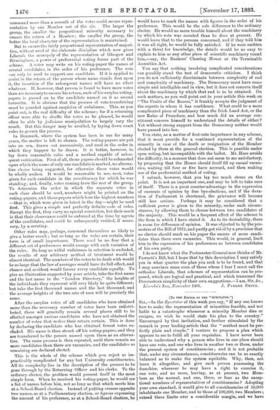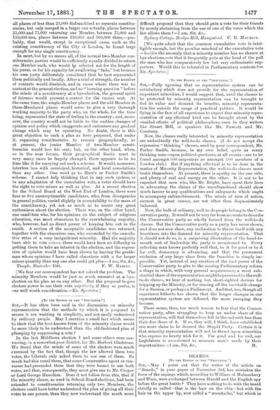rTo THE EDITOR OF THE " SPECTATOILl SIR, — In the Spectator
of this week you say, " If any one knows how to make the representation of minorities feasible, and not liable to a catastrophe" whenever a minority Member dies or resigns, we wish he would state his plan to the country." Encouraged by that invitation, and further stimulated by the remark in your leading article that the " method must be per- fectly plain and simple," I venture to propose a plan which appears to me to fulfil all your requisites. I have never been able to understand why a person who lives in one place should have one vote, and one who lives in another two or three, under the present system of constituencies ; and it is not probable that, under any circumstances, constituencies can be so exactly balanced as to make the system equitable. Why, then, not leave it altogether, and give each person possessing the franchise, wherever he may have a right to exercise it, • one vote, and no more, leaving, as at present, two Mem- bers as the normal, and one, three, or four as the excep- tional numbers of representatives of constituencies ? Adopting your own standard, it would give to all constituencies of 50,000 inhabitants one Member, and to those of 100,000, two Members ; extend these limits over a considerable margin, and we have
all places of less than 25,000 disfranchised as separate constitu- encies, but only merged in a larger one actually, places between 25,000 and 75,000 returning one Member, between 75,000 and 150,000 two, places between 150,000 and 300,000 three,—pro- bably, that would, except in exceptional cases, such as the existing constituency of the City of London, be found large enough for any single constituency.
In most, but by no means all, of the normal two-Member con- stituencies, parties would be sufficiently equally divided to return one Member each, who would lie selected not for the length of his purse, or for his capacity for swallowing "fade," but because his own party deliberately considered that he best represented them politically and locally. After a trial of strength, the number of contests would diminish, and in cases where there was no contest at the general election, and no " burning question " before the minds of a constituency at a bye-election, the general spirit of fairness would prevent a contest for the vacant seat. At the same time, the single-Member places and the odd Member in three-Membered places would serve to give a very thorough working majority to the party who, on the whole, for the time being, represented the state of feeling in the country; and, more- over, the country would not be liable to the sudden changes of opinion and policy which exaggerate and caricature any gradual change which may be operating. No doubt, there is this great objection to such a plan as here proposed, that under it, supposing constituencies to remain geographically, as at present, the junior Member of two-Member consti- tuencies would lose his seat; but, on the other hand, when, as in the near future, their geographical limits must in very many cases be largely changed, there appears to be no time like it for carrying out such a scheme. It would, moreover, interfere less with municipal, historical, and local associations than any other. One word as to Hare's or Parker Smith's scheme. I cannot help thinking that in any such system, or in any adaptation of the cumulative vote, a voter should have the right to vote minus as well as plus. At a recent election for the School Board at the West End of London, there were four or five unexceptionable candidates, who, from divergencies in general politics, varied slightly in acceptability to the mass of the constituency, yet not so much as to create any great enthusiasm about the election. There was, on the other hand, one candidate who, for his opinions on the subject of religious education, was most obnoxious to the overwhelming majority, who, however, had no direct power of keeping him out in the result. A section of the acceptable candidates was returned, together with the obnoxious one, who succeeded by the cumula- tive votes of a very insignificant minority. Had the majority been able to vote ?anus, there would have been no difficulty in getting them to take an interest in the election, and the expres- sion of opinion would have been shown by leaving the gentle. man whose opinions I have called obnoxious with a far larger minus quantity than any one else could get plits.—I am, Sir, &c., [We fear our correspondent has not solved the problem. The minority Members would be just as much unseated at a bye- election on his plan as on any other. But the proposal to give electors power to use their vote negatively, if they so prefer, is one well worth consideration.—En. Spectator.]



































 Previous page
Previous page